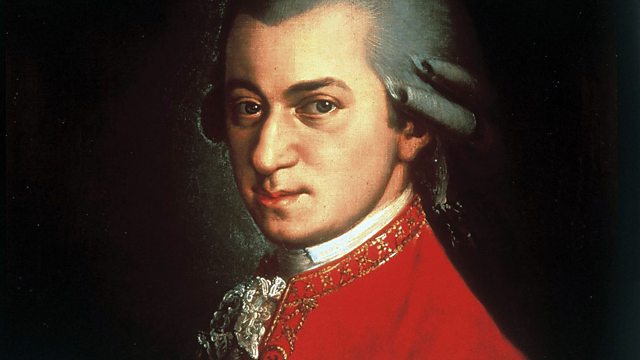
Last Thoughts
Donald Macleod explores the miraculous chamber music of Mozart's Vienna years. A late masterpiece and music for an instrument said to drive its performers insane.
This week Donald Macleod explores the miraculous chamber music of Mozart's Vienna years. Today, a late masterpiece; and music for an instrument said to drive its performers insane.
In 1791, a blind musician called Maria Anna Antonia Kirchgessner came to Vienna on the latest leg of a long-running tour of Europe. She was then one of the leading virtuosi on her instrument - the glass harmonica. She must have commissioned Mozart to write a piece for her, because he took time out from work on The Magic Flute to produce an ethereal Adagio and Rondo for glass harmonica, flute, oboe, viola and cello - thereby making a valuable addition to the repertoire of music for the family of 'autophone rubbed instruments'. The claims of insanity may not have been entirely without foundation: the glass used contained 40% lead, so lead poisoning must have been a real danger. Another now-defunct instrument prompted Mozart to compose a work that has secured itself a much firmer footing in the repertoire: his Clarinet Quintet in A, K 581 - or, as it should perhaps be known, Basset Clarinet Quintet in A. The basset clarinet was devised by Mozart's friend and fellow-mason the clarinettist Anton Stadler in collaboration with an instrument-maker called Theodor Lotz. Essentially a regular clarinet with a downwards extension of range, it survived - just - into the 19th century before going into a long spell of retirement, until its revival in the 1950s for a performance of Mozart's Clarinet Concerto, which was also written for the instrument's basset variety.
Larghetto in B flat for piano and wind quintet, K 452a
Mitsuko Uchida (piano)
Neil Black (oboe)
Thea King (clarinet)
Julian Farrell (basset horn)
Robin O'Neill (bassoon)
Adagio and Rondo in C for glass harmonica, flute, oboe, viola and cello, K 617
Bruno Hoffmann, glass harmonica
Aurèle Nicolet (flute)
Heinz Holliger (oboe)
Karl Schouten (viola)
Jean Decroos (cello)
Clarinet Quintet in A major, K. 581
Thea King (basset clarinet)
Gabrieli String Quartet.
Last on
More episodes
Next
You are at the last episode
Music Played
-
![]()
Wolfgang Amadeus Mozart
Fragment [larghetto] in B flat major K.452a
Performer: Mitsuko Uchida. Performer: Neil Black. Performer: Thea King. Performer: Julian Farrell. Performer: Robin O’Neill. Singer: Julian Farrell.- DG: 483 3000.
- 483 3000.
- 58.
-
![]()
Wolfgang Amadeus Mozart
Adagio and Rondo in C minor K.617
Performer: Bruno Hoffmann. Performer: Aurèle Nicolet. Performer: Heinz Holliger. Performer: Karl Schouten. Performer: Jean Decroos.- DG: 483 3000.
- DG.
- 9.
-
![]()
Wolfgang Amadeus Mozart
Clarinet Quintet in A major K.581
Performer: Thea King. Performer: Gabrieli String Quartet.
Broadcasts
- Fri 8 Sep 2017 12:00����ý Radio 3
- Fri 8 Sep 2017 18:30����ý Radio 3
Beethoven Unleashed – the box set
What was really wrong with Beethoven?
Composers A to Z
Who knew? Five eye-opening stories from Composer of the Week
Five reasons why we love Parry's Jerusalem
What is the strange power of Jerusalem which makes strong men weep?
A man out of time – why Parry's music and ideas were at odds with his image...
The composer of Jerusalem was very far from the conservative figure his image suggests.
Composer Help Page
Find resources and contacts for composers from within the classical music industry.





